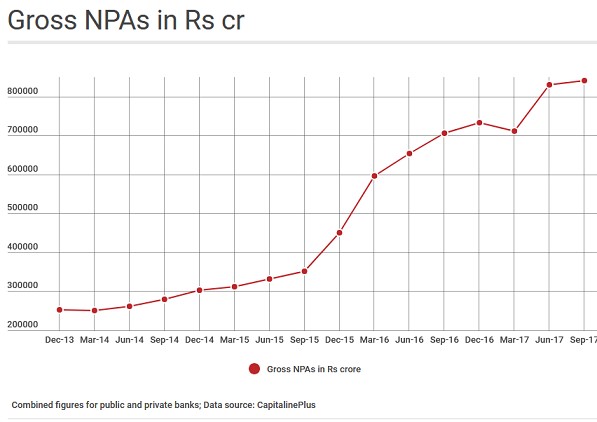The Indian banking sector is a ticking time bomb that no one can defuse at this point. Weighed down by a massive pile-up of bad debt and expanding losses for years, the country now has to deal with the reality of a government that is either unwilling or unable to fix things.
Non-performing assets (NPAs) by both private and state-owned banks in the world's seventh-largest economy have now ballooned to more than Rs 8 lakh crore (about $123 billion), equal to about 5 percent of the country's gross domestic product (GDP).
Total stressed assets including NPAs, written off loans, restructured loans have passed Rs 10 lakh crore (about $154 billion), or 12 percent of total loans by the country's banking system.
Looked at in another way, Indian banks are likely to recover only Rs 88 out of every Rs 100 loaned out.
That's a recipe for disaster, but sadly nothing much is likely to change in a hurry.

(Click to enlarge)
Source: FirstPost
A Lame Duck Banking Management
Reserve Bank of India's (RBI) governor Urjit Patel's May 14 speech is symptomatic of what ails India's banking industry in general.
Speaking a month after the country's biggest banking fraud was unearthed, the governor highlighted more than a dozen things that are wrong with the banking system. But his speech quickly turned into a game of passing the buck after refusing to admit culpability for the scandal and instead shifting the blame to the government.
It defies logic how the Punjab National Bank's management could continue doling out fresh loans like confetti for years to a company that had defaulted on its first loan--a modest one at that. Related: The Most Traded ETF In U.S. Stock Markets
It turns out that the country's third-largest bank does not have a fully-integrated CBS system that could have detected the fraud before it escalated into a jaw-dropping $2 billion. A CBS is a back-end centralized software system that posts daily updates of a bank's transactions across all its branches and generates alerts if any activities raise a red flag.
House of Cards Could Come Tumbling Down
The PNB ruckus is by no way an isolated incident: India’s banking systems are generally weak. India is no doubt faced with a daunting task trying to clean up this mess because the country just doesn't have many options at all.
Recovering all the money owed is out of the question. In fact, it's estimated that banks will have to absorb at least 60 percent of those debts in the form of write-offs, which could throw them in a deep profit hole for several quarters, if not years.
In late 2017, the government announced a recapitalization plan that will see it inject Rs 2,11,000 crore into the system. But that amount will merely serve as a temporary antidote and a major surgical operation will still be needed.
Ultimately, the greatest danger will be if the mess in India's banks spills over to the general economy (as it did during the Japanese banking crisis of the late 90s) and its neighbors.
The South Asian country had been slated to become the third-biggest contributor to world economic growth from 2017-2019. But the entire house of cards could come tumbling down unless the country's banks quickly change tack.
By Charles Benavidez for Safehaven.com
More Top Reads From Safehaven.com:
















